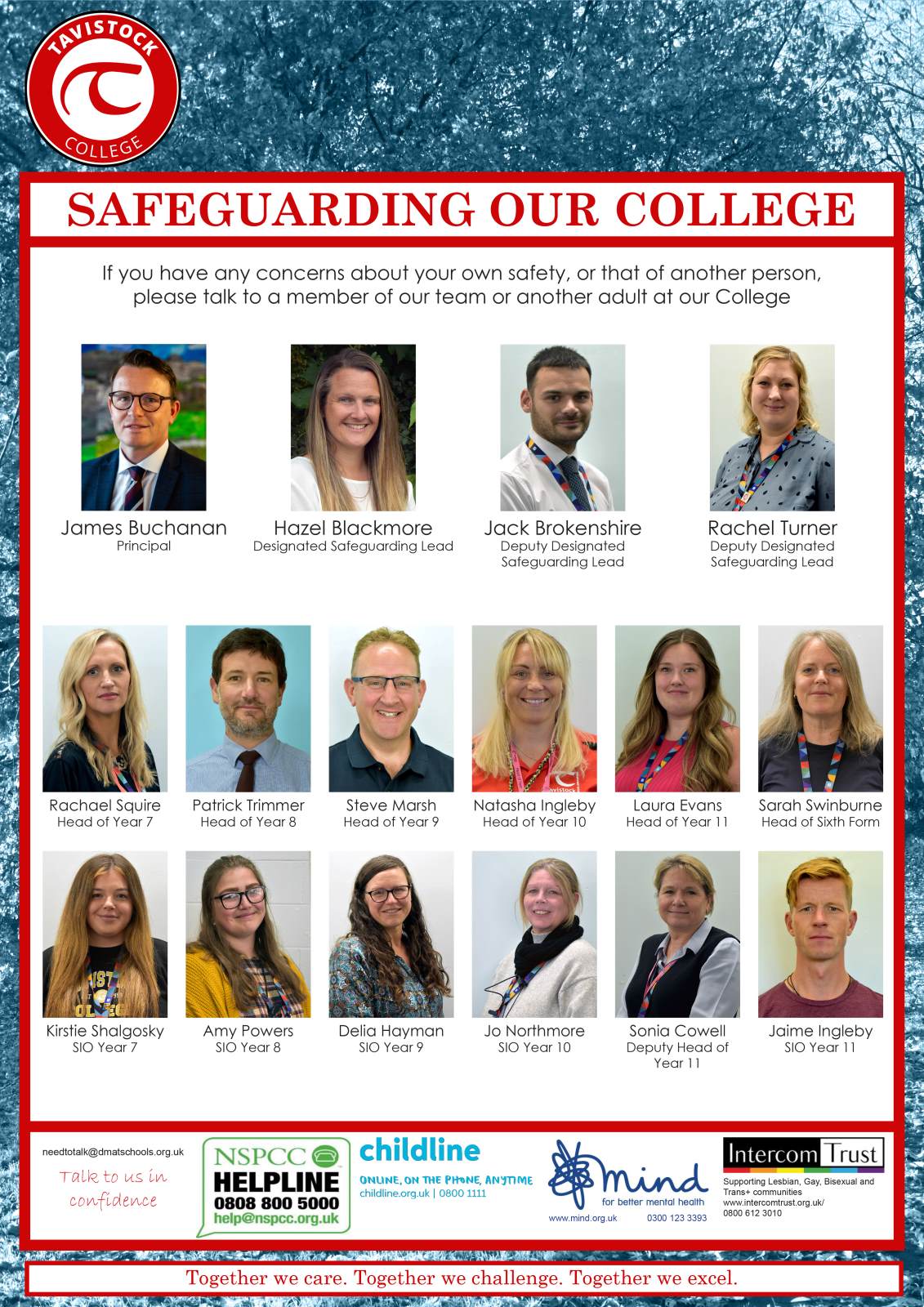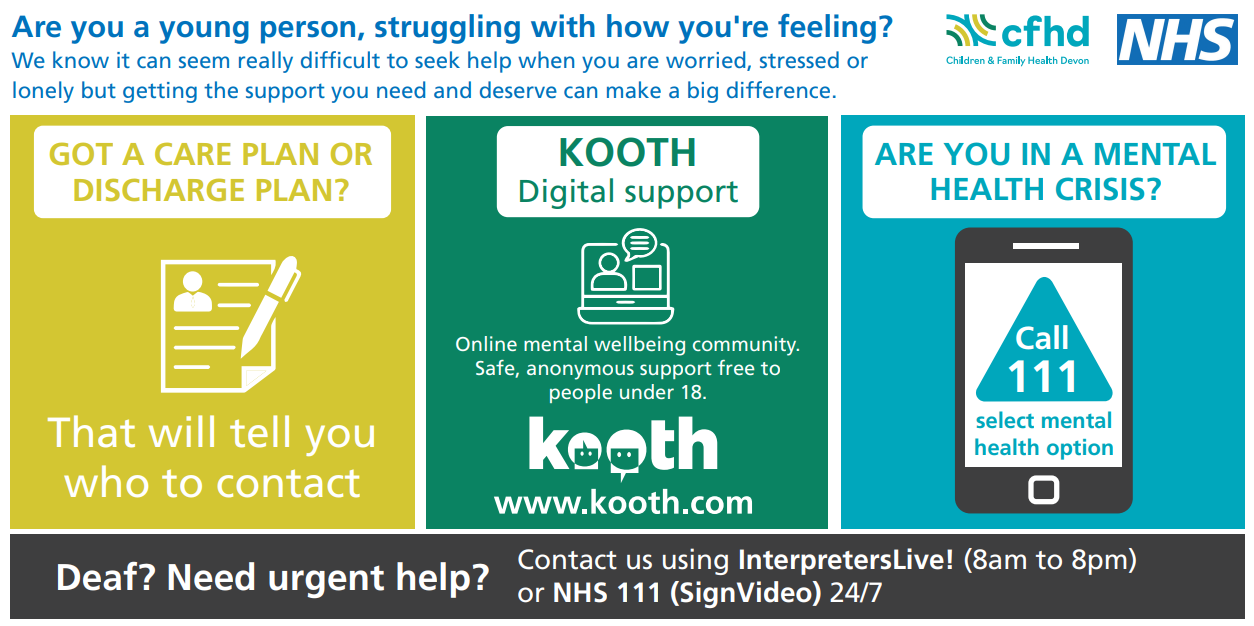Safeguarding

At Tavistock College, we are committed to safeguarding and promoting the welfare of all our students. We recognise that all staff and governors have a full and active role to play in protecting our students from harm, and that the welfare of our children is our paramount concern. We believe every child has the right to feel safe, supported, listened to and we strive to provide a caring, positive, safe, and stimulating environment that promotes the social, physical, and moral development of every individual.
Designated Safeguarding Contacts
If you have any safeguarding concerns or need support, please contact:
Designated Safeguarding Lead (DSL):
Hazel Blackmore – h.blackmore@dmatschools.org.uk
Deputy Designated Safeguarding Leads (DDSLs):
Jack Brokenshire – j.brokenshire@dmatschools.org.uk
Rachel Turner – r.turner@dmatschools.org.uk
Need to Talk?
If you are a student and have a concern for yourself or someone else, you can report it in the following ways:
Speak directly to a trusted member of staff
Complete a student statement form (available at reception or from a member of staff)
Email: needtotalk@dmatschools.org.uk
Complete the anonymous form: https://forms.gle/AXw4UTiMEWcyhPoS9
Information for Parents and Carers
If you have a safeguarding concern outside of school hours, at weekends, or during school holidays, please contact:
- Devon Children’s Front Door Service – for urgent safeguarding concerns - Email: mashsecure@devon.gov.uk | Tel: 01392 388 428
- NSPCC – NSPCC | The UK children's charity | NSPCC | Tel: 0808 800 5000
- Childline – Childline | Free counselling service for kids and young people | Childline | Tel: 0800 1111
- CAMHS (Child and Adolescent Mental Health Services) – via your GP or CAMHS | DPT and visit Mental health services - NHS for more information.
The Devon Safeguarding Children Partnership site contains useful information, guidance and more. Click here to open in a new window.
Safeguarding is everyone’s responsibility. Thank you for helping us keep all of our students safe.
Mental Health
Sometimes children suffer from a mental health crisis that requires an urgent response and/or more specialist intervention. We always advise that if you are worried about your child’s mental health to seek support from your GP in the first instance but please also let us know what your concerns are too. Your GP may refer your child to CAMHS (Children and Adolescent Mental Health Services) or signpost to other organisations.
We are also working with the Mental Health in Schools Team. What is that?
The Mental Health Support Team in Schools (MHST) is a new NHS service commissioned to work with a number of schools across Devon and Torbay and in the community . We offer early intervention to help children and young people with their mental health and emotional wellbeing.
We offer individual and group Low-intensity Cognitive Behavioural Therapy (Li-CBT) evidence based interventions. We work in schools to support their ‘whole school approach’ to mental health by offering:
- Workshops and training to children, families and education staff
- Consultations
- Mental Health Ambassador Programme
- Mental Health Audits and much more.
For more information, visit The Mental Health Support Team.
Our Positive Mental Health Policy can be found here:
Positive Mental Health Policy 25-26

Online Safety
We highly recommend that parents/carers take a look at www.internetmatters.org This website has good quality information, guidance and advice for keeping children safe online. You can search by issue, (e.g. cyber-bullying; screen time; online grooming...) and by age and has a section on setting controls.
Please remember there are some simple, basic steps you can take to supporting your children online at home:
- Recognise, and accept - most of us spend a considerable amount of time online, and certainly did so during the height of the pandemic. That’s the same for children and young people as well as parents and carers.
- Don’t worry so much about screen time - what are your children and young people actually doing when they are online? There should be a good balance of different activities. Try to check in on this by looking at your child’s screen regularly and checking their search history if you are concerned.
- Follow some of the basic guidance from healthcare professionals - specifically have tech-free mealtimes and don’t have technology in the bedroom overnight
- Talk to your children - take time to understand what they are doing online – don’t always assume that they are up to no good. The most important thing is that if something does go wrong children and young people feel that they are able to come and speak to someone. The way we react when our children tell us about a problem is absolutely crucial – overreacting can be counterproductive and may deter your children from continuing to be open with you about these things.
- Be a good role model - be mindful of your own online habits and try to model healthy practices (e.g. tech-free mealtimes and technology in the bedroom overnight!)
Online Sexual Abuse
If you are worried that a child is being abused online they, or you can report it to CEOP (Child Exploitation and Online Protection command) which is a law enforcement agency designed to keep children and young people safe from sexual exploitation and abuse.
https://www.ceop.police.uk/safety-centre/






